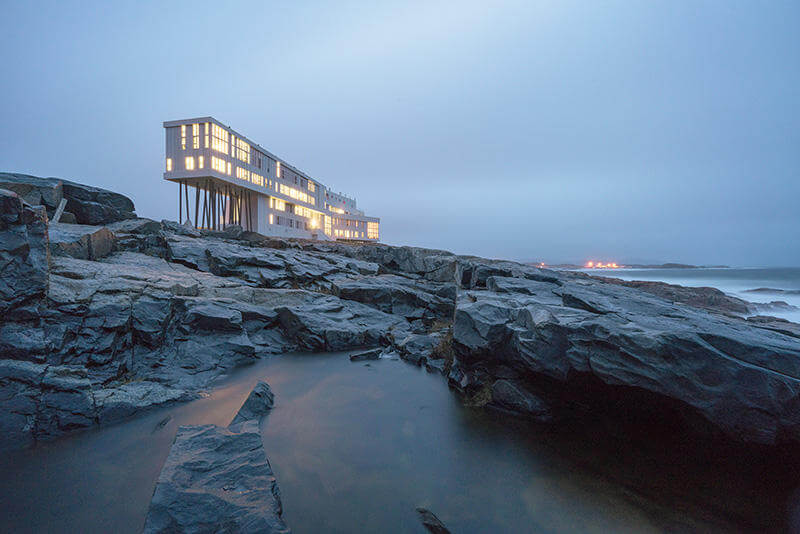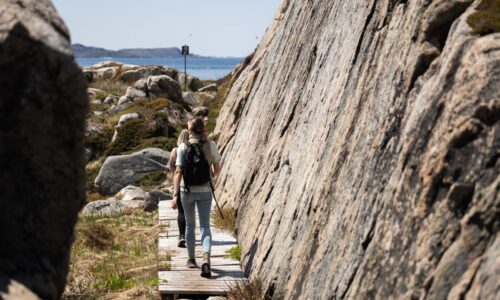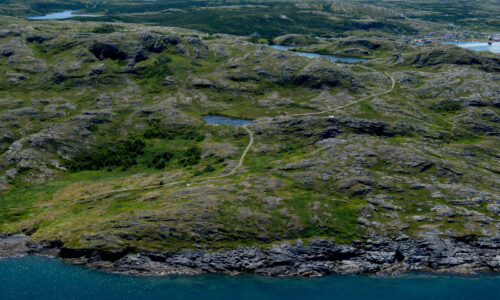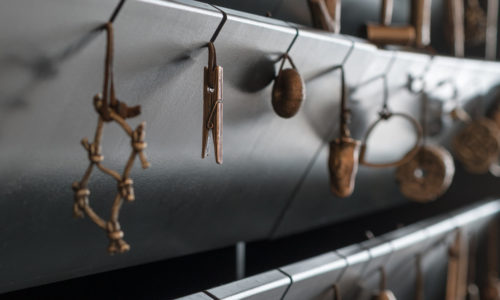In Uncategorized | By Fogo Island Inn | December 12, 2017
Spotlight: Fogo Island Inn—Sustainable Tourism for Development on Fogo Island
“A culture survives when it has enough confidence in its past and enough say in its future to maintain its spirit and essence through all the changes it will inevitably undergo. ”‐ Wade Davis, ethnographer
It's Not About Money
"Development? It's not about money. If you start with the economics, you're already getting it wrong." Zita Cobb is discussing the innovative revitalization of Fogo Island, a collection of fishing outports, set lightly on a chunk of ancient rock off the north coast of Newfoundland.
Behind the revitalization is Shorefast, a registered Canadian charity sponsoring a rich diversity of artistic, cultural and social business initiatives on Fogo Island. Zita started the charity with two of her brothers when she returned to her home island following a career in technology, with more money than she needed to live and a mission to strengthen the struggling community. Today she is Shorefast’s CEO, and contributions from the Canadian and Newfoundland governments, charitable giving, and earned income have augmented that initial private donation.
If it's not about the money, how does Shorefast approach development? Says Zita, "We exist in relationship to the whole: the whole planet, the whole of humanity, the whole of existence. The purpose of development is to help people belong to the world in a way that reflects their specificity, honours their unique ways of knowing, and fosters resiliency."
For Shorefast, business serves social ends. "Our mission is to build cultural and economic resilience on Fogo Island. We believe in a world where all business is social business. Business is a system, a social and economic instrument that can be used to support place and shape relationships." So Shorefast creates and invests in opportunities that build ‘sacred’ social, cultural and natural capital as well as financial and economic benefit. In its portfolio of interconnected businesses and charitable programs, the best known is the Fogo Island Inn.
Its bold structure rises like an iceberg beside the ocean, luminous white except when kissed pink by dawn or sunset. In the four years since it opened, the Inn’s unforgettable image has graced countless tourism and design publications, along with tributes to its charming guest rooms, excellent table, and delightful hospitality. It has won award after award. Most recently, Travel + Leisure World’s Best Awards 2017 named it Best Resort Hotel, Canada, and ranked it #12 of the Top 100 Hotels in the World.
Tourism is central to Fogo Island’s holistic development effort. Broadly, Zita explains, "tourism brings awareness to cultures that have been left behind. Often these are places where people have a particular and profound engagement with the natural world, bringing with it very specific ways of knowing. Tourism is a way for all of us to learn from these people, and preserve the ways of knowing for the good of all humanity." What makes it sustainable is when local culture, knowledge, social relationships, and natural resources are strengthened rather than undermined by tourist traffic.
“Avoiding the scourge of unemployment may have less to do with chasing after growth, and more to do with building an economy of care, craft and culture.” ‐ Tim Jackson, economist
The Love of a Stranger
Designed by Newfoundland‐born architect Todd Saunders, the Inn's rectangular structures and supporting stilts (known as 'shores') reimagine the construction of local homes and fishing stages on a grand scale. Inside, the marriage of local craftsmanship and leading international design continues. Each piece of furniture was designed based on traditional shapes and materials, for the modern eye and physique. Most items were then hand‐made locally, leveraging traditional skills of boat‐building, woodworking, quilting and knitting. In this way, building the Inn did not just provide jobs; it dignified people with beautiful, meaningful work. And it provided opportunities for young Fogo Islanders to learn traditional skills.
Tourists are initially drawn to Fogo Island by the design of the Inn and its meticulously hand-‐crafted furnishings. But most agree that the awe of first seeing the Inn, the visceral pleasure of a Bertha chair, and the delight in learning who made their quilt, soon pale beside the cheerful kindness of the staff. Community hosts show guests around the island, perhaps pausing to pick berries, visit a friend’s place to snack on fresh‐caught fish, or hike up Brimstone Head, one of the four corners of the Flat Earth. Visitors are greeted by name at mealtimes, and stopped for a chat in the lobby. The warmth shining through every encounter embodies the saying that "genuine hospitality entails nothing less than the love of a stranger". Turns out this deep hospitality is another Fogo Island tradition, a way of being forged over generations in an isolated community, under the harshest conditions.
“(The Inn) is an act of human culture that helps us to try and situate our own existence within a sublime landscape that defies comprehension.” ‐ Domus Magazine
"Fogo Island Inn is a 100% social business: it was built using philanthropic funds and all surpluses are returned to Shorefast for reinvestment in the Community of Fogo Island. There are no investors seeking a return, and there is no private gain." Each member of the community is a beneficial owner of the Inn. Locals and tourists alike mix in the lobby. Community members are invited to use the library, and the art gallery and movie theater often host events for all. When the Inn opened, each Fogo Islander was invited to spend a night at the Inn for free. As a result, locals genuinely welcome the tourists. In turn, tourists become friends and advocates for the Inn and the island when they return home.
The Inn's peak tourist season (>90% occupancy) has expanded from July‐August two years ago to May‐October today, and an increasing number of B&B type accommodations have opened around the island. Is this tourism sustainable? From an environmental perspective, sustainability has been designed into the Inn. It has its own primary waste treatment facility, and a solar panel system that heats rooms and water for most of the year.
From a social perspective, the Inn actively spreads the benefits of tourism throughout the community. Last year, it was responsible for 153 jobs, paying well over market rate wages. It engages freelancers and local businesses to guide tours and offer experiences to guests. Most of the food served at the Inn comes from local growers and fishers, with generous pricing for high quality produce. Begun as a means to create all the furnishings for the Inn, the Fogo Island Shop is now a thriving social business, shipping pieces around the world. From a cultural perspective, all of the activities offered to visitors are specific and relevant to the island — e.g., fishing, hiking, berry picking, and craft workshops.
Several factors also limit the numbers of tourists visiting Fogo Island. The Inn has only 29 rooms, and there are no chain hotels. Other B&Bs and guest accommodations are small in scale. Access from Gander, the nearest major town, entails either a 90 minute drive and 45 minute ferry ride, or a helicopter. And with rooms priced at over $1,000 per night, the Inn is beyond the means of many travelers. The combination of limited numbers, thoughtful programming, wealth distribution, and environmental stewardship ensure that tourism to the island is high quality and sustainable.
"Fogo Island Inn is a place like no other, with a people who know how to squeeze beauty out of life at its extremes." ‐ The Washington Times
Stewardship, Fairness and Benefit Tracking
Three themes characterize the interplay of sustainable tourism and holistic development at Fogo Island Inn. First, from the deep connection to this specific place and people, comes a commitment to the stewardship of ‘sacred’ social, cultural and environmental capital. Yes, the Inn creates economic opportunities. But its greater focus is on preserving equitable social relationships and strengthening the local culture. And it is designed to interact lightly with the natural environment.
Second, fairness is built in to every aspect of the endeavor. Opportunities are shared throughout the community. Wages and payments for fish, produce, and crafted items are all well above market rates.
Third, the Inn tracks the distribution of financial benefits using innovative ‘economic nutrition’ labels. “Where possible, money belongs right here on Fogo Island, in constant circulation to benefit the entire community.” The label breaks down the cost of your stay at the Inn into compensation (employment), materials costs, operations, sales, and contribution to Shorefast for reinvestment in the community. It also shows the geographic distribution of economic benefits. Fifty percent of your payment for a night at the Inn goes toward compensation. Sixty‐three percent of the money stays on Fogo Island to benefit local people and businesses, and only 7 percent leaves Canada.
Zita summarizes the philosophy that so far has successfully harnessed sustainable tourism as an engine for development on Fogo Island. “We keep the most important thing the most important thing.”
This article was written by Katy Paul‐Chowdhury, PhD, founder of INKorporated Business Writing.https://inkorporatedbusinesswriting.com






